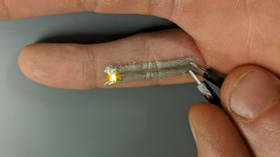Printed electronic tattoos could transform healthcare and the battlefield

Engineers have developed a method of printing electronic devices directly onto human skin. The eyebrow-raising breakthrough could be used to create high tech bespoke bandages and may even become another tool in modern warfare.
Scientists have been trying to create so-called electronic tattoos for years now and the latest development represents a significant step forward for the spooky-sounding technology.
The system created by researchers from Duke University is gentle enough to work on delicate surfaces including paper and human skin. The boffins say that it could pave the way for embedded electronic tattoos for “biological tagging” and bandages containing patient-specific biosensors.
The scientists developed an ink laced with silver nanowires that can be printed directly onto skin at low temperatures using an aerosol printer. The thin film is dry in less than two minutes and works even after being bent more than a thousand times.
As well as “biological tagging” Professor Aaron Franklin, one of the researchers, said the tattoos could be used for “unique detection mechanisms,” “on-the-fly custom electronics,” and “customized bandages.”
“Think about creating bespoke bandages that contain electronics like biosensors, where a nurse could just walk over to a workstation and punch in what features were needed for a specific patient,” Franklin said. “This is the type of print-on-demand capability that could help drive that.”
Also on rt.com Homeland Security fuses all biometric data on an Amazon server - what could go wrong?As with many technological breakthroughs a military use for the technology has already been devised. Another group of researchers from the University of Minnesota have developed a low-cost 3D printer which would enable soldiers to print disposable sensors on their hands which could detect such things as chemical or biological agents in the field.
Like this story? Share it with a friend!













